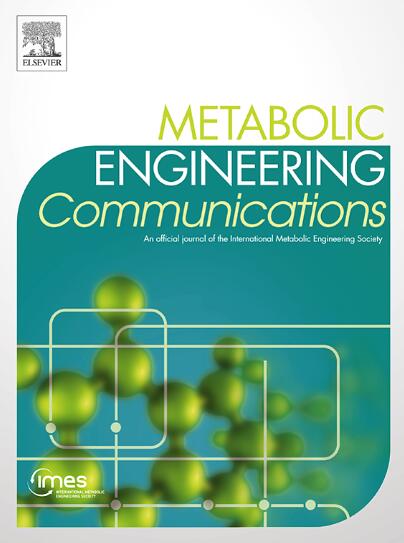Engineering Pseudomonas putida for production of 3-hydroxyacids using hybrid type I polyketide synthases
IF 4.1
Q2 BIOTECHNOLOGY & APPLIED MICROBIOLOGY
引用次数: 0
Abstract
Engineered type I polyketide synthases (T1PKSs) are a potentially transformative platform for the biosynthesis of small molecules. Due to their modular nature, T1PKSs can be rationally designed to produce a wide range of bulk or specialty chemicals. While heterologous PKS expression is best studied in microbes of the genus Streptomyces, recent studies have focused on the exploration of non-native PKS hosts. The biotechnological production of chemicals in fast growing and industrial relevant hosts has numerous economic and logistic advantages. With its native ability to utilize alternative feedstocks, Pseudomonas putida has emerged as a promising workhorse for the sustainable production of small molecules. Here, we outline the assessment of P. putida as a host for the expression of engineered T1PKSs and production of 3-hydroxyacids. After establishing the functional expression of an engineered T1PKS, we successfully expanded and increased the pool of available acyl-CoAs needed for the synthesis of polyketides using transposon sequencing and protein degradation tagging. This work demonstrates the potential of T1PKSs in P. putida as a production platform for the sustainable biosynthesis of unnatural polyketides.
利用杂交I型聚酮合成酶生产3-羟基酸的工程恶臭假单胞菌
工程型I型聚酮合成酶(t1pks)是一个潜在的小分子生物合成的变革性平台。由于其模块化的性质,t1pks可以合理设计,以生产广泛的散装或特种化学品。虽然在链霉菌属微生物中对异源PKS表达的研究最多,但最近的研究主要集中在对非本地PKS宿主的探索上。在快速发展的工业相关东道国进行化学品生物技术生产具有众多的经济和物流优势。凭借其利用替代原料的天然能力,恶臭假单胞菌已成为可持续生产小分子的有前途的主力。在这里,我们概述了恶臭杆菌作为表达工程化t1pks和生产3-羟基酸的宿主的评估。在建立了工程T1PKS的功能表达后,我们利用转座子测序和蛋白质降解标记成功地扩大和增加了合成多酮所需的可用酰基辅酶a库。这项工作证明了p.p utida中t1pks作为可持续生物合成非天然聚酮的生产平台的潜力。
本文章由计算机程序翻译,如有差异,请以英文原文为准。
求助全文
约1分钟内获得全文
求助全文
来源期刊

Metabolic Engineering Communications
Medicine-Endocrinology, Diabetes and Metabolism
CiteScore
13.30
自引率
1.90%
发文量
22
审稿时长
18 weeks
期刊介绍:
Metabolic Engineering Communications, a companion title to Metabolic Engineering (MBE), is devoted to publishing original research in the areas of metabolic engineering, synthetic biology, computational biology and systems biology for problems related to metabolism and the engineering of metabolism for the production of fuels, chemicals, and pharmaceuticals. The journal will carry articles on the design, construction, and analysis of biological systems ranging from pathway components to biological complexes and genomes (including genomic, analytical and bioinformatics methods) in suitable host cells to allow them to produce novel compounds of industrial and medical interest. Demonstrations of regulatory designs and synthetic circuits that alter the performance of biochemical pathways and cellular processes will also be presented. Metabolic Engineering Communications complements MBE by publishing articles that are either shorter than those published in the full journal, or which describe key elements of larger metabolic engineering efforts.
 求助内容:
求助内容: 应助结果提醒方式:
应助结果提醒方式:


